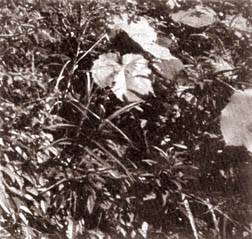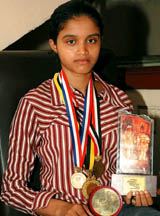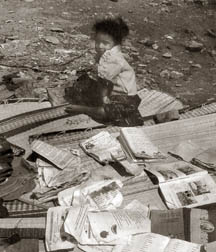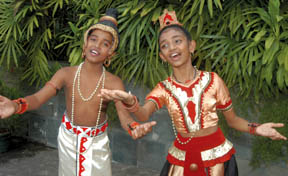|
observer |
|
|
|
|
|
OTHER LINKS |

|

|

|
|
|
|
|
Hope For Children, the British charity working in Sri Lanka, has lent its support to the Department of Probation and Child Care Services, to implement a nutrition programme for tsunami-affected, under-nourished children under the age of five. The programme launched to mark National Year of the Child, is now operative in 20 Divisional Secretariat units with 100 children covered.
Soon, it will be extended to bring in another 200 children in 40 Divisional Secretariat units, covering all the tsunami-affected parts of the island.
Each child is entitled to a food basket worth Rs. 800 per month, through the Co-operative stores.
The programme is supervised and monitored by the Child Rights Promotion Officers of the Department, with the assistance of the Family Health Workers. Records are kept to assess the impact of the programme on each individual child.
Awareness programmes on herbal plants
Last week, we wrote about the research centre for medicinal plants that the Indigenous Medicine Ministry is planning to establish, with the aim of protecting and conserving our indigenous herbs. We informed you that the Ministry has allocated Rs. 1,479,000, and that land in Matara has also been offered in this regard.

This however, will not be all the government is planning to do to enhance this sector of nature. Awareness programmes will be held for schoolchildren, villagers and private institutions to improve their knowledge about herbal plants. Research on such plants will be facilitated for university students, local and foreign scientists, ayurvedic physicians and other interested groups.
The launching of a website with photographs and other records and the publication of journals, books, manuals and audio/video cassettes will also be part of the project.
Scientific research using tissue culture and other techniques to preserve and increase the number of endangered and valuable species will also be conducted at this centre.
Eco-tourism programmes, ayurvedic native health clinics and centres to provide training on growing medicinal plants with a high demand, will be some of the other activities to be carried out at the proposed research centre.
Exhibition by schoolgirl artist
Jayamali Weerasinghe is still a student of Swarnamalee Balika Vidyalaya, Kandy, but she is already having her own art exhibition. Over a thousand of her paintings, which follow the Eastern tradition, is currently being displayed at Hotel Thilanka, Kandy. The exhibition, which started on the 15th of this month, will conclude on the 31st.

Jayamali, who had a fascination for art and painting from a young age, now studies art as a school subject.
She follows the old style of painting adopted by our ancient artists, which has been discarded by modern day artists in favour of Western styles. She has adopted this style to remind the public of our glorious traditional art. She is especially talented in painting under Buddhist themes.
Jayamali says it needs patience to follow this kind of style. She has practised her art under many veteran artists and was especially grateful to her art teachers for helping and encouraging her.

Her parents, schoolteachers Ms Srimathi Herath of Udaperadeniya Vidyalaya, Vijitha Kumarihami and Wasantha Kumari and veteran watercolour artist, M.D.S. Gunatilake earned her special gratitude.
Jayamali is a good landscape artist with the watercolour media too. She has won many awards for her arts.
However, her talents are not confined to art; she is also good at Mathematics and is a skilled carom player too.
The exhibition also shows the work of Pradeep Munasinghe of Peradeniya University and Asanka Siriwardena of Kelaniya University.
Duo on stage
Having now performed the role several times and being thoroughly familiar with his lines, Thanushka Gayan Perera has no difficulties turning himself into the character he acted in the play, 'Vidura Natakaya' when I met him recently. Clearing his throat, he raises his head and in a loud, deep voice says, "Nangi, piyanan vadinawa". As the eldest son of Vidura in the play, after singing with his sister, he brings the attention of the audience to his father, Vidura, on the stage.
|
|
Thanushka, a Grade 6 student of Thurstan College, Colombo says, "I acted as the son of Vidura piyanan in the play, during the Vesak and Poson festivals". Showing a keen interest in the arts and music, other than acting, he plays the thabla and has won awards at All Island singing competitions. His younger sister too sings with him on children's programmes on the SLBC. He is grateful to his parents and his grandmother, Kumari Perera, for the support and guidance they have given him. "When I grow up, I wish to be a good actor", says Thanushka.
His friend and companion on stage, Lakshika Sewwandi, who plays the role of the little girl in the drama, says, even though she likes music and dancing, she wishes to be a lawyer when she grows up. A Grade 7 student at Dharmapala MV, Kottawa, she is grateful to her teachers for the encouragement and guidance they have given her.
The youngest in a family of three, she says she cherishes the love shown her by her parents, her eldest sister, who is a teacher, her eldest brother who is in the Air Force, and her youngest brother, Laknath, who had accompanied her to Lake House for this interview. "He watches me act on stage, but does not comment on my performances," says Lakshika.
Thanushka and Lakshika are proud of the roles they play in Vidura Natakaya, which has already been staged in Colombo and Bellanvila, and will continue to be performed every Poya day in the months ahead, at various places of worship all over the country. "We like acting, but we will never let it interfere with our studies", they say in unison.
AD
Solving the water problem
The shortage of water is a rather severe problem in Hambantota and its suburbs, as you may have heard. If you are a resident of this area, you may know just how serious a problem it is. The Disaster Relief Services Ministry has now launched a programme with the aim of solving this problem.
The objective of the project is to provide drinking water and water for cultivation development. The establishment of rain water tanks, rain water lakes and cultivation wells will be part of the plan. These steps will be taken under a government plan to protect people from drought, floods and natural disasters.
Hambantota and its surrounding areas, such as Tissamaharama, Lunugamvehera, Ambalantota and Sooriyawewa, are constantly plagued by drought, resulting in the residents facing many hardships.
This programme is expected to be extended to other areas as well, based on feasibility reports. The government has also provided tanks to store sufficient quantities of water for people in Monaragala, Polonnaruwa, Ampara and Anuradhapura.











